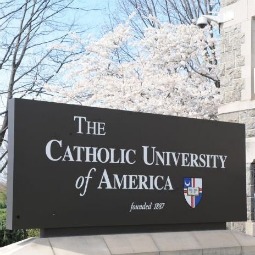Ordinary Time Is Ordered Time
The weeks between the Solemnity of Corpus Christi and the beginning of Advent are called Ordinary Time. This does not mean that this time is simply boring or ho-hum.

T.S. Eliot wrote, "Time present and time past are both perhaps present in time future and time future contained in time past." With this poetic riddle, Eliot ponders the nature of time and the mystery of time’s redemption.
We also ponder the redemption of time through the Church year. The weeks between the Solemnity of Corpus Christi and the beginning of Advent are called Ordinary Time. This does not mean that this time is simply boring or ho-hum.
Instead it is called "Ordinary Time" because the weeks are numbered. The Latin word ordinalis, which refers to numbers in a series, stems from the Latin word ordo, from which we get the English word "order."
Ordinary Time is therefore "ordered time." Ordinary Time begins in the weeks after Christmastide with one of two Gospel stories: John the Baptist’s acknowledgment of Christ as the Lamb of God or Christ’s first miracle — the transformation of water into wine at the wedding at Cana. These two stories remind us that Ordinary Time is the time of Eucharistic dispensation.
You might say Ordinary Time, therefore, represents the age of the Church — this long dispensation of history in which we know Christ through the sacrament of his body, the Church. It is a time in which our lives are ordered around the mystery of the Eucharist.
Ordinary Time is the time after Pentecost. The Church was launched into Ordinary Time, if you like, after the coming of the Holy Spirit. This is the time of the Church’s mission to the world. This is the time of the proclamation of the Gospel and the administration of the sacraments of salvation.
We order our time within the Church through the gift of the Church year — in which, by a regular annual cycle, we order time according to the mysteries of our redemption.
By calling it "Ordinary Time" or "Ordered Time," we are reminded that human history is part of God’s plan. When he set the sun, moon and stars in place, he also established the natural order of times and seasons. More than that, he did not set the whole natural order running, then step back like the Watchmaker Deity and cease to be involved.
As God brought order out of chaos at creation, so he constantly brings order into history and works in and through the events of history. History, as the Sunday school teacher tells us, is "His story."
In Galatians 4:4, St. Paul writes, "In the fullness of time, God sent forth his Son, born of a woman." In other words, the incarnation of the Lord in Bethlehem in the Roman Empire at that particular point in history was not a mistake. The time of Our Lord’s incarnation was "the fullness of time." Everything was perfect for God’s plan to be brought to fruition.
This belief in the providence of God in the world is the Catholic antidote to a pernicious heresy active in our increasingly atheistic society today. "Historicism" is the idea that history is simply a sequence of random events. Historicism teaches that the events of history are essentially meaningless reactions to circumstances, economics and political and ideological conflicts. Historicism denies that there is any "overarching narrative" or "greater meaning" to history.
Historicism’s sister is atheistic Darwinism — the idea that nature is a meaningless and brutal battleground between species for survival. Historicism says history is, likewise, a jungle — a battleground between people and nations struggling for dominance and survival. This is a logical consequence of atheism. If there is no God, there can be no overarching plan or purpose to nature or history.
So, for the secular atheist, history — like nature — has no greater meaning. Time, therefore, has no greater meaning.
If history and time have no meaning, then life itself is empty and the words of Shakespeare’s Macbeth about time echo the sad, solemn and cynical truth:
Tomorrow, and tomorrow, and tomorrow,
Creeps in this petty pace from day to day,
To the last syllable of recorded time;
And all our yesterdays have lighted fools
The way to dusty death ...
Life’s but a walking shadow, a poor player
That struts and frets his hour upon the stage
And then is heard no more.
It is a tale told by an idiot, full of sound and fury,
Signifying nothing.
Ours is not the philosophy of the murderer Macbeth. As we go to Mass each week of Ordinary Time, we remember that time is ordered by the Lord of Time. History is ordered by the Lord of History, and, if this is so, our own days are ordered by the Lord of Love.
He knows when every sparrow falls. He has the very hairs of our heads numbered, and, knowing this, we order our time — and with the Psalmist pray, "Lord, teach us to number our days, that we may apply our hearts unto wisdom."
Father Dwight Longenecker
is the parish priest of Our Lady of the Rosary Church in
Greenville, South Carolina. Connect with his blog,
browse his books and be in touch at DwightLongenecker.com.
- Keywords:
- July 14-27, 2013

















